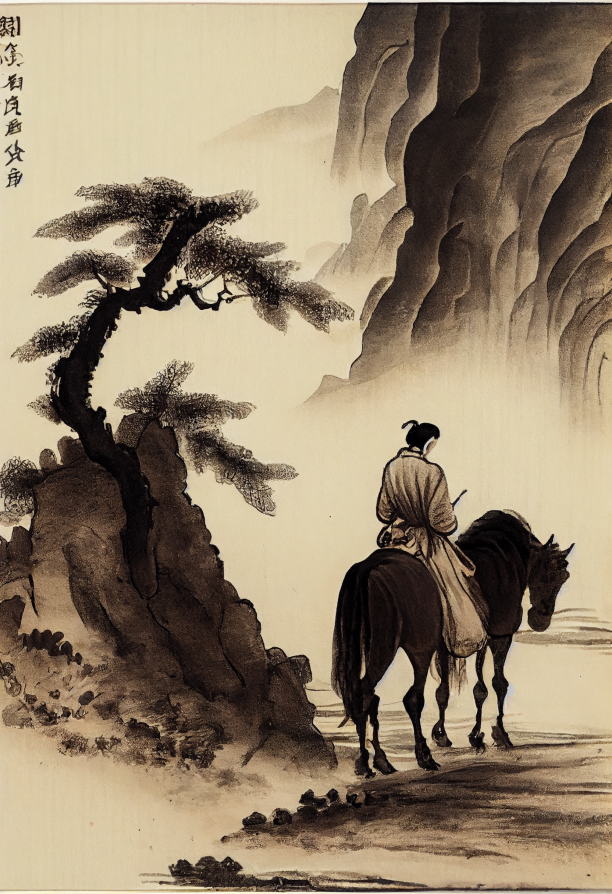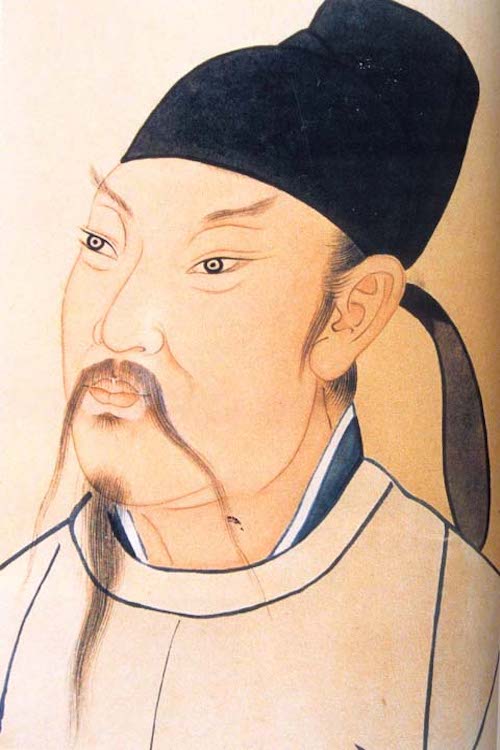
Green hills that rise beyond the walls,
A guardian moat that eastward calls.
We bid farewell, you’ll journey on,
Like a dandelion, a path unknown.
The sky’s white clouds that drift and dream,
Like your wanderings, forever out of reach.
The setting sun, unwilling to leave,
Mirrors my longing, my love’s reprieve.
We wave goodbye, each on our own way,
The horse that bore my friend, now neighs astray.
Unwilling to depart, its whinnies raise
My sorrow, amplifying my dismay.
This is a farewell poem full of poetic and picturesque flavor. The poet and his friends ride horses to bid farewell, full of affection and touching. In addition to the quatrain “To Wang Lun”, Li Bai’s poems for seeing off his friends are most famous for his five-character verse. This poem has always been popular, and it is a masterpiece when it is selected into the textbook.
The first couplet, “Green mountains across the north, and white water around the east city”, explained the farewell location. The poet has already sent his friend out of the city, but the two are still bridle side by side, unwilling to separate. In the distance, green mountains stretch across the north of the outer city, and sparkling water flows around the east of the city. In these two sentences, “Qingshan” is against “Baishui”, and “Beiguo” is against “Dongcheng”. The first couplet is written as a beautiful couplet, which is unique; The word “horizontal” outlines the quiet posture of the green hills, and the word “around” depicts the dynamics of the white water. The words are accurate and vivid. The poetic pen is swaying freely, depicting a beautiful and beautiful picture. I didn’t see the word “farewell”, but when I tasted it carefully, the pen was clearly full of reluctance to say goodbye.
The two couplets in the middle are on point, expressing the affection of parting. The Chinese couplet “Being farewell to this place will lead thousands of miles away from a lonely peng”, which means that once this place is farewell, Liren will fly with the wind like a grass and go thousands of miles away. These two sentences express the deep reluctance for friends. The writing is like flowing clouds and flowing water, comfortable and natural, not sticking to confrontation, and unique. The neck couplet is “Floating cloud wandering child’s meaning, setting sun old friend’s love”, but it is written very neatly, “floating cloud” is to “setting sun”, “youzi’s meaning” is to “old friend’s love”. At the same time, the poet cleverly uses “floating clouds” and “sunset” as comparisons to express his heart. A white cloud in the sky, floating with the wind, symbolizes the indeterminate whereabouts of a friend and anything; a round of red sunset in the distance is slowly setting, as if he could not bear to leave the earth suddenly, which is a metaphor for the poet’s reluctance to say goodbye to his friend. Seeing off against the background of beautiful mountains and rivers and the red sun shining in the west, the poet is particularly nostalgic and feels inseparable. There are both scenery and emotion here, and the scenes are blended and exciting.
The two sentences in the last couplet are more affectionate. “Wave your hand and go here, Xiao Xiao’s team crows.” Sending you a thousand miles, you have to say goodbye. “Waving hands” is about the action of separation. The poet did not express his inner feelings directly, but only wrote the moving scene of “Xiao Xiao Ban Ma Ming”. This sentence comes from “The Book of Songs·Xiaoya·Che Gong”: “Xiao Xiao Ma Ming.” Class horse, outlier horse. The poet and his friends waved goodbye on horseback and paid tribute frequently. The two horses seemed to understand their master’s mood, and they were unwilling to leave their companions. When they parted, they couldn’t help whistling, as if they had infinite affection. Li Baihua’s use of classical verses and the word “ban” brings out new ideas and highlights the lingering friendship, which is a superb handwriting.
This farewell poem is novel and unconventional. In the poem, the verdant mountains, clear flowing water, fiery red sunset, and white floating clouds set off each other with brilliant colors. The troop horse sings, and the image is fresh and lively. The beauty of nature and the beauty of humanity are intertwined, and the writing is vivid and vivid. The rhythm of the poem is bright, the emotion is sincere, warm and open-minded and optimistic, without any lingering sentimentality. This is the feature of Li Bai’s farewell poems, which are highly appreciated by critics.
青山橫北郭,白水繞東城。
此地一爲別,孤蓬萬里徵。
浮雲遊子意,落日故人情。
揮手自茲去,蕭蕭班馬鳴。

Li Bai (701-762), considered one of China’s greatest poets alongside Du Fu, lived during the Tang Dynasty’s golden age of poetry. Known for his vivid imagery and deep emotion, Li Bai’s work spans about 1,000 poems on themes like nature, friendship, and existential reflections. Celebrated for his spontaneous verse and exploration of Taoist ideals, Li Bai’s poetry also deeply admires the natural world and ancient times, often challenging life’s ordinary constraints. His depiction of China’s landscapes combines natural beauty with personal sentiment. Earning the title ‘Poetry Immortal,’ Li Bai’s influential poetry is globally admired for its artistic and philosophical depth.
Image: MidJourney/DALL-E 2